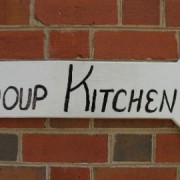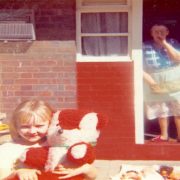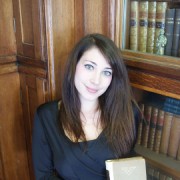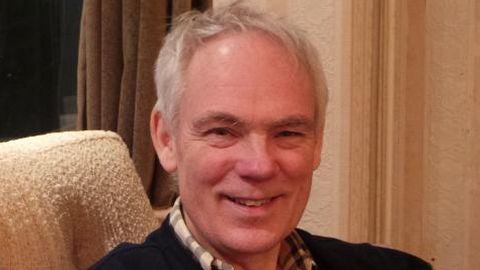
Ross Burgess in his home in Croydon. Pic: Alice Harrold
The work of an activist is never done it seems. Ross Burgess, now 70 years old, has been working to improve the lives of those in the gay and lesbian community for over half a century and still strives for this purpose today. Through his work on the LGBT History Project, Burgess has helped to preserve the history of gay culture in the UK online which has been the theme of this year’s LGBT History Month.
Burgess lives with his partner at their home on a street with a view in Purley. Chatting over a cup of tea in his living room which has been filled with collected bric-a-brac, Burgess has a welcoming manner and speaks openly about the details of his life, halting only when struggling to remember a year.
Burgess is the leader of the Silver Rainbow, a social group for older LGBT people in Croydon where he lives with his husband Roger Burg, 65. The couple registered for Ken Livingstone’s London Partnerships in 2002 and became civil partners in 2004 in Addington Palace, Surrey, on the first day of legal ceremonies. On both occasions they thought that was as far as they would come in terms of legal commitment. But they converted their civil partnership into a marriage last month after 17 years together, a right that Burgess thought “inconceivable” when he first came out as gay.
His life of social activism began with the Campaign for Homosexual Equality. When the CHE formed in 1964, before Burgess joined, he was in his first relationship. The main campaign at the time was for the decriminalisation of gay sex. “We were illegal”, Burgess says of his then partner. “We could have gone to jail.” He speaks about this time without bitterness but with calm reflection. The ban was lifted in 1967 although the age of consent for gay men was set at 21 and was not reduced to 18 until 1994.
Burgess founded the Tunbridge Wells chapter of the CHE in 1972 after moving to the area and realising that there was not a section of the organisation. It was a source of social community as much as political activity.
“I had moved with my then partner to Tunbridge Wells and didn’t know anyone there. The relationship went through a difficult period as a result of which I was pretty lonely. I didn’t know any people locally and gay people certainly.”
When Burgess started the Tunbridge Wells section of CHE the campaigns focused on the age of consent and getting gay news covered in the local press before the issues of civil partnerships and same sex marriage became possible.
Today Burgess is on the national committee. The CHE, which at one time had over 5,000 members and 100 local groups around the country, has commissioned its official history to be written by Peter Scott-Presland and edited by Burgess. The first of three volumes of Amiable Warriors is due to be released this month.
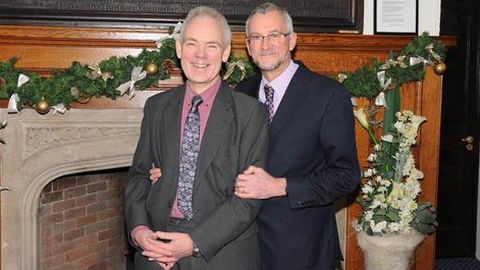
Ross Burgess and Roger Burg “married at last”. Pic: Alice Harrold
Scott-Presland is the founder of Homo Promos, an LGBT and queer-friendly theatre company in London, founded in 1988 and named after the infamous Section 28 of the Local Government Act 1988 which said that a Local Authority “shall not intentionally promote homosexuality”.
This year’s LGBT History Month, which takes place every February, has been themed around “hidden histories and coded stories”, focusing on figures from the past who found ways to express their sexualities despite social obstruction and forced secrecy. Figures such as Frida Kahlo, who was bisexual, and Alan Turing, who was gay, are being celebrated. Their stories are a reminder of how far gay rights have come in recent years. During one lifetime the laws towards homosexuals in Britain have made a dramatic turnabout, driven by a change in society’s outlook. Burgess is one of those who has lived through this change. When he came out, aged 22, he still had to keep his love life secret from society as homosexual sex was illegal at the time; today he is married to his partner.
In 2008 Burgess started a lunch club for Silver Rainbow in partnership with Age Concern Croydon and the Upper Norwood Association for Community Care to allow older LGBT people in the area to interact better. Most of the members who attend the monthly events at the Waterside Centre were members of Croydon Area Gay Society which began in the early 1970s.
Burgess never imagined fighting for equal marriage when he began his life as an activist: “I think it would have been pretty well inconceivable at that time.” It was inconceivable because “there were no role models” for LGBT people in accepted relationships, he explained. “Although I’ve had several partners, in each case I felt this is the person I want to be with.”
When asked what message he would give to LGBT youth, Burgess called on some slogans of campaigns he has fought and won: “Be yourselves. Be not afraid. Gay is good. There are many ways to live your life and your relationships are valid. Be accepting of diversity.”

